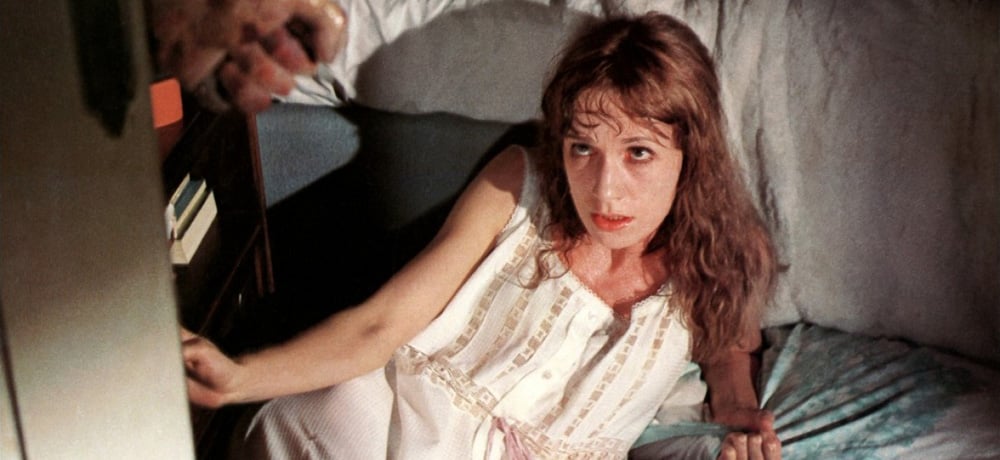






Mario, Mario, wherefore art thou, sweet Mario? I imagine he’s dust by now, having passed away in 1980. His films, however, live forever. One that is rarely mentioned is his swan song, Shock (1977); a shame too, because it is much stronger (and more effective) than critics have labeled it through the years, offering up a melee of evil kids, possession, telekinesis, and other assorted sub-genres in a compelling way.
Released on his home turf in August, Shock didn’t receive an American release until March of ’79 under the title Beyond the Door II, cashing in on the hit from a couple of years earlier while nothing to do with said film. (Other than the boy from the first being in this one, that is.) No matter what it was called, critics were unkind and the film floated into the ephemera of the occasional mom and pop video store. But time has been pretty gentle with a film unfairly compared to Bava’s earlier input – this is a finale well worth celebrating.
Dora (Daria Nicolodi – Deep Red), her new husband airline pilot Bruno (John Steiner – Tenebrae), and her son from her first marriage, Marco (David Colin Jr. – Beyond the Door), move back into the house they lived in with her first husband Carlo (Nicola Salerno). Divorced? Not that easy. Carlo was an artist and abusive husband who killed himself while out at sea; Dora then spends the next six months in an asylum suffering from a total break with reality.
Once back at the shack, Dora is confronted by not only specters of her late husband, but by the increasingly odd behavior of Marco, who takes to dry humping his mom when he isn’t actively trying to drive her mad or busy plotting to kill Bruno. Has Marco gone mad, is Dora still mad, or is Carlo back in their lives to spend some time with his family?
Shock is a little bit of column A, column B, and finds room for C and D as well; that so many sub-genres are woven into the story may seem like typical Italian fodder, but Bava (with an assist from his son Lamberto, who co-directed uncredited) knows how to weave a story that will at least come across as coherent without too close inspection. The screenplay by Bava Jr., Gianfranco Barberi, Alessandro Parenzo, and Dardano Sacchetti (The Beyond) has a slow build to a frenzied third act, but the journey there is rewarding nevertheless; Bava creates an air of unease through camera movement, filtered through Dora’s psyche, leaving us unclear at times exactly what is going on. This is intentional though, as all of the family secrets are dealt in a harried flop sweat so as to not miss anything.
And the final twists do play fair, and are consistent with (mostly) everything that has gone before – with the exception of Carlo/Marco’s voodoo moment in trying to bring down Bruno’s plane. (Hey, we all have limits as to what we’ll choose to believe in movies.) It all unfolds according to the logic that Bava has set up; whether critics went along or not is irrelevant – it is a film as confident as his more celebrated works.
I think this “lower tier” Bava take stems from the fact that he and his cinematographer Alberto Spagnoli (The Red Queen Kills Seven Times) opt not to flood the screen with his usual florid color schemes, but rather settle for a more naturalistic look; this is very much in line with the essential crux of the film: domestic abuse and guilt.
Despite its trappings, Shock is quite intimate in nature; nearly the entire story takes place inside the manor (Bava still likes his gothic, see?) causing an insular vibe becoming of the tale and what it wishes to get across – Dora feels guilt for Carlo’s death, which manifests itself through her only connection to him, Marco. Being a horror film, the inner turmoil results in overt, fantastical manifestations of it; every vivid and horrifying dreamscape of Dora’s, every attack from Carlo and/or Marco is her psyche crying out for peace.
Bava was always the master of ingenious camera effects, and he and Spagnoli created some stunning moments, most famously the gag that The Prodigy paid homage to last year; there’s also a scene in which Dora, dreaming, lays still as her hair erotically contorts and twists all around her. It’s stunning, and a fast reminder that even near the end, no one could compose a shot like Bava.
Colin Jr. and Steiner are both fine as Marco and Bruno respectively; the former especially is effective at conveying that blank menace that only kids seem to pull off so well. Nicolodi however, gives her best performance in Shock; she needs to pull off so many emotions – fear, anger, confusion – and she completely pulls the audience along to the end. The film simply would not work without her.
From here on out I’d like to just offer a couple of words on Daria Nicolodi. As I was writing this week’s column, the news came out that she passed away at the much too young age of seventy. I have no idea of her circumstances or if she was ill; I do know she was constantly on social media offering words of encouragement, and celebration of all her accomplishments – her performances in her former beau Dario Argento’s films like Deep Red and Tenebrae, for starters, not to mention Suspiria was her idea and she co-wrote the script. And though she will grace us with her regal presence and ethereal beauty no more, we have been left a legacy of film in which we can continue to admire the impact she made on horror. Film is kind to the fallen, especially to those who shone so bright. Shine on, Miss Nicolodi.
Shock is available on DVD from Blue Underground.
Next: Drive-In Dust Offs: THE NIGHT OF A THOUSAND CATS (1972)